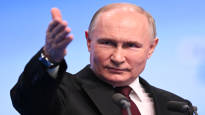EU leaders are seeking more military support for Ukraine at a summit starting today. The interests of Russia’s frozen funds are wanted for the armament of Ukraine.
BRUSSELS “Europe must wipe the smile off Putin’s face”, an analyst at the Brussels-based think tank EPC Amanda Paul write on his blog.
He is dissatisfied with the efforts of EU countries in supporting Ukraine against Russia. According to him, Ukraine’s poor success on the battlefields is due to the West’s weak aid last year, and Putin’s self-confidence is due to the West’s fear of giving Ukraine the necessary weapons.
Recently, many researchers have tried to awaken citizens to the idea that Ukraine may not survive the war with honor.
Turku University of Economics professor and Russia researcher Kari Liuhto estimates that Russia will launch a major offensive by the end of the summer. He says that if Russia succeeds in occupying Ukraine, probably thousands of people will be executed and millions of Ukrainians will flee to Europe.
Researcher at the Foreign Policy Institute Calm Karelian states In the FIIA Briefing Paper, that unless the EU radically increases arms aid to Ukraine, the country will probably not become an EU member state or a European democracy. In this case, Ukraine may be caught between Russia and the West and exposed to Russia’s power aspirations.
French researcher Ulrich Bounat warned that Europe should also prepare for the collapse of Ukraine. According to him, we may have to think about how far Europe is willing to go with its support. He refers to the French president Emmanuel Macron to talk about the need to prepare to send troops to Ukraine as well.
The frozen interest rates in Russia are wanted
The leaders of EU countries meeting in Brussels are trying to decide on ways to increase support for Ukraine.
The member states agreed last week that five billion euros will be paid to Ukraine this year to the defense fund.
The EU leaders are surely patting each other on the back for the agreement, because agreeing on the support was difficult.
Tyyne Karjalainen estimates in the press release that the shrinking of Ukraine’s new arms aid fund to only a quarter of the planned amount of 20 billion euros shows that the EU is not practically committed to Ukraine’s victory in the war or EU membership.
Ukraine’s military support seems to consist of small streams. Of course, many countries directly provide bilateral aid to Ukraine.
One stream is the use of interest income from Russia’s frozen assets, which the EU Commission has just proposed, to arm Ukraine. The proposal still needs to be approved in the member states.
Interest income would be three billion euros this year. In total, about 200 billion euros of Russian funds are frozen, but this amount is not being touched.
The decision on the use of the money has been slowed down, among other things, by Germany’s fear that confidence in the European financial markets will suffer.
Finland pushes EIB money into the defense industry
The meeting also talks about strengthening the EU’s own defense industry. In the EU, 80 percent of defense purchases are imported goods, and we want to reverse this trend towards the EU.
France in particular emphasizes its own procurement, because it has a lot of its own industry. Finland emphasizes more that Ukraine needs defense equipment so quickly that it must be obtained from where it can be obtained the fastest.
Finland was the first signatory to the initiative of 14 countries, according to which the European Investment Bank should start financing the defense equipment industry.
The idea of EIB’s new role was already in the strategy of the defense industry. Bringing the matter to the table of the heads of state could speed up the processing.
At the summit, Finland is also pushing for a preparedness union, where the EU should also pay attention to preparing for crises within the countries. Finland considers itself to be a good teacher here. President Sauli Niinistö I got a report on crisis preparedness from the EU Commission.
